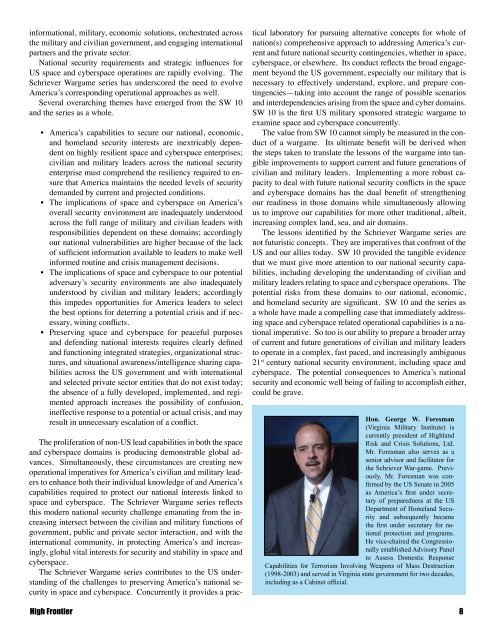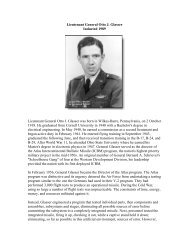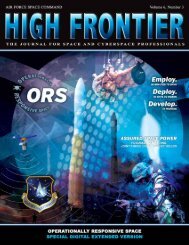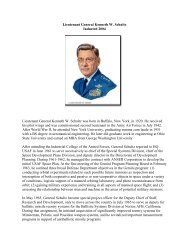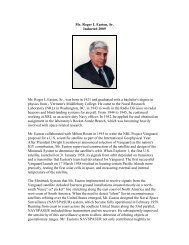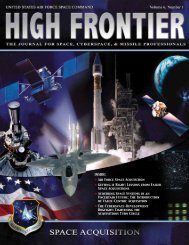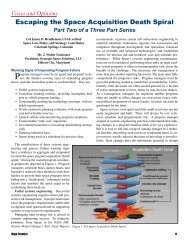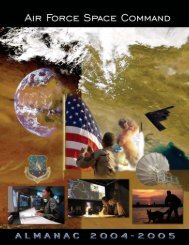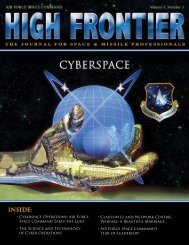Schriever Wargame 2010 - Air Force Space Command
Schriever Wargame 2010 - Air Force Space Command
Schriever Wargame 2010 - Air Force Space Command
- No tags were found...
You also want an ePaper? Increase the reach of your titles
YUMPU automatically turns print PDFs into web optimized ePapers that Google loves.
informational, military, economic solutions, orchestrated across<br />
the military and civilian government, and engaging international<br />
partners and the private sector.<br />
National security requirements and strategic influences for<br />
US space and cyberspace operations are rapidly evolving. The<br />
<strong>Schriever</strong> <strong>Wargame</strong> series has underscored the need to evolve<br />
America’s corresponding operational approaches as well.<br />
Several overarching themes have emerged from the SW 10<br />
and the series as a whole.<br />
• America’s capabilities to secure our national, economic,<br />
and homeland security interests are inextricably dependent<br />
on highly resilient space and cyberspace enterprises;<br />
civilian and military leaders across the national security<br />
enterprise must comprehend the resiliency required to ensure<br />
that America maintains the needed levels of security<br />
demanded by current and projected conditions.<br />
• The implications of space and cyberspace on America’s<br />
overall security environment are inadequately understood<br />
across the full range of military and civilian leaders with<br />
responsibilities dependent on these domains; accordingly<br />
our national vulnerabilities are higher because of the lack<br />
of sufficient information available to leaders to make well<br />
informed routine and crisis management decisions.<br />
• The implications of space and cyberspace to our potential<br />
adversary’s security environments are also inadequately<br />
understood by civilian and military leaders; accordingly<br />
this impedes opportunities for America leaders to select<br />
the best options for deterring a potential crisis and if necessary,<br />
wining conflicts.<br />
• Preserving space and cyberspace for peaceful purposes<br />
and defending national interests requires clearly defined<br />
and functioning integrated strategies, organizational structures,<br />
and situational awareness/intelligence sharing capabilities<br />
across the US government and with international<br />
and selected private sector entities that do not exist today;<br />
the absence of a fully developed, implemented, and regimented<br />
approach increases the possibility of confusion,<br />
ineffective response to a potential or actual crisis, and may<br />
result in unnecessary escalation of a conflict.<br />
The proliferation of non-US lead capabilities in both the space<br />
and cyberspace domains is producing demonstrable global advances.<br />
Simultaneously, these circumstances are creating new<br />
operational imperatives for America’s civilian and military leaders<br />
to enhance both their individual knowledge of and America’s<br />
capabilities required to protect our national interests linked to<br />
space and cyberspace. The <strong>Schriever</strong> <strong>Wargame</strong> series reflects<br />
this modern national security challenge emanating from the increasing<br />
intersect between the civilian and military functions of<br />
government, public and private sector interaction, and with the<br />
international community, in protecting America’s and increasingly,<br />
global vital interests for security and stability in space and<br />
cyberspace.<br />
The <strong>Schriever</strong> <strong>Wargame</strong> series contributes to the US understanding<br />
of the challenges to preserving America’s national security<br />
in space and cyberspace. Concurrently it provides a practical<br />
laboratory for pursuing alternative concepts for whole of<br />
nation(s) comprehensive approach to addressing America’s current<br />
and future national security contingencies, whether in space,<br />
cyberspace, or elsewhere. Its conduct reflects the broad engagement<br />
beyond the US government, especially our military that is<br />
necessary to effectively understand, explore, and prepare contingencies—taking<br />
into account the range of possible scenarios<br />
and interdependencies arising from the space and cyber domains.<br />
SW 10 is the first US military sponsored strategic wargame to<br />
examine space and cyberspace concurrently.<br />
The value from SW 10 cannot simply be measured in the conduct<br />
of a wargame. Its ultimate benefit will be derived when<br />
the steps taken to translate the lessons of the wargame into tangible<br />
improvements to support current and future generations of<br />
civilian and military leaders. Implementing a more robust capacity<br />
to deal with future national security conflicts in the space<br />
and cyberspace domains has the dual benefit of strengthening<br />
our readiness in those domains while simultaneously allowing<br />
us to improve our capabilities for more other traditional, albeit,<br />
increasing complex land, sea, and air domains.<br />
The lessons identified by the <strong>Schriever</strong> <strong>Wargame</strong> series are<br />
not futuristic concepts. They are imperatives that confront of the<br />
US and our allies today. SW 10 provided the tangible evidence<br />
that we must give more attention to our national security capabilities,<br />
including developing the understanding of civilian and<br />
military leaders relating to space and cyberspace operations. The<br />
potential risks from these domains to our national, economic,<br />
and homeland security are significant. SW 10 and the series as<br />
a whole have made a compelling case that immediately addressing<br />
space and cyberspace related operational capabilities is a national<br />
imperative. So too is our ability to prepare a broader array<br />
of current and future generations of civilian and military leaders<br />
to operate in a complex, fast paced, and increasingly ambiguous<br />
21 st century national security environment, including space and<br />
cyberspace. The potential consequences to America’s national<br />
security and economic well being of failing to accomplish either,<br />
could be grave.<br />
Hon. George W. Foresman<br />
(Virginia Military Institute) is<br />
currently president of Highland<br />
Risk and Crisis Solutions, Ltd.<br />
Mr. Foresman also serves as a<br />
senior advisor and facilitator for<br />
the <strong>Schriever</strong> War-game. Previously,<br />
Mr. Foresman was confirmed<br />
by the US Senate in 2005<br />
as America’s first under secretary<br />
of preparedness at the US<br />
Department of Homeland Security<br />
and subsequently became<br />
the first under secretary for national<br />
protection and programs.<br />
He vice-chaired the Congressionally<br />
established Advisory Panel<br />
to Assess Domestic Response<br />
Capabilities for Terrorism Involving Weapons of Mass Destruction<br />
(1998-2003) and served in Virginia state government for two decades,<br />
including as a Cabinet official.<br />
High Frontier 8


